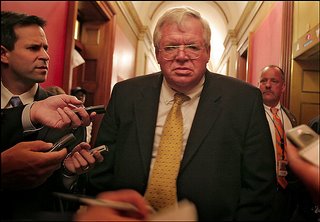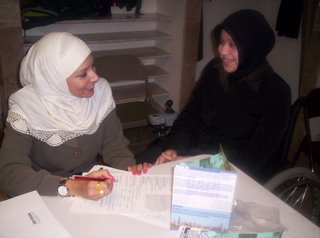The Senate and House are expected to meeting in a joint conference committee to come up with an immigration reform bill. House Speaker, Dennis Hastert (R-IL) has announced “hearings” on immigration that will continue through the summer. House GOP leaders are opposed to Bush’s push for an immigration bill that provides relief for undocumented immigrants and their families. Republicans have been divided with some favoring a comprehensive immigration reform bill that provides some protections while others are holding their ground on an enforcement only bill.
In a move that could bury President Bush's high-profile effort to overhaul immigration law until after the midterm elections, House GOP leaders yesterday announced a series of field hearings during the August recess, pushing off final negotiations on a bill until fall at the earliest.
The announcement was the clearest sign yet that House Republicans have largely given up on passing a broad rewrite of the nation's immigration laws this year. They believe that their get-tough approach -- including building a wall along the border with Mexico and deporting millions of illegal immigrants -- is far more popular with voters than the approach backed by Bush and the Senate, which would create a guest-worker program and allow many illegal immigrants to apply for U.S. citizenship.
House GOP leaders said yesterday that several committee chairmen will hold field hearings in congressional districts in the Southwest, the South and other areas where the issue of illegal immigration is especially potent. Those hearings will take place before the start of the formal negotiating process between the House and Senate, which could take months to complete given the complexity of the issue and the competing business, labor and social concerns. "I'm not putting any timeline on this thing, but I think we need this thing done right," Speaker J. Dennis Hastert (R-Ill.) said after a House leadership strategy session.
Senate negotiators played down the hearings, noting that informal talks had already started between the House and the Senate. "There's a general recognition that we need a bill," said Senate Judiciary Committee Chairman Arlen Specter (R-Pa.), a key backer of the Senate legislation. "We're going to get together. We're going to sit down and try to work it all out."
Asked whether a deal could be struck with the Senate this fall, in the throes of a difficult reelection season, House Majority Whip Roy Blunt (R-Mo.) allowed: "I think that's possible. I don't know how likely it is." White House spokeswoman
Dana Perino sought to put the House announcement in a positive light, saying the
field hearings could "possibly provide an opportunity to air out issues" that
she conceded are "complex." But she added: "The president is undeterred in his
efforts to pass comprehensive immigration reform."
Rep. Tom Tancredo (R-Colo.), who is leading the fight against the Senate plan, said: "Odds were long that any so-called 'compromise bill' would get to the president's desk this year. . . . The nail was already put in the coffin of the Senate's amnesty plan. These hearings probably lowered it into the grave." Sen. Edward M. Kennedy (D-Mass.), one of the main authors of the Senate plan, called the announcement "a cynical delaying tactic."
The House move was widely viewed as a slap at Bush, who is seeking a comprehensive immigration bill along the lines of the one approved by the Senate on May 25, which would tighten border controls, establish a guest-worker program for future immigrants and offer most of the nation's estimated 12 million illegal residents a chance to become citizens. The announcement came shortly after Bush left on a trip to Europe.
House Republicans have long frowned upon the president's approach. In December, they passed a bill that would tighten border controls, clamp down on employers who hire undocumented workers, and declare illegal immigrants and those who assist them to be felons. Their position was solidified this month after Republican Brian Bilbray defeated Democrat Francine Busby by running against Bush's immigration plan in a hard-fought special election to replace imprisoned former congressman Randy "Duke" Cunningham (R-Calif.).
Since then, House leaders have dragged their feet on naming negotiators to a House-Senate conference to reconcile the chambers' two bills. The field hearings, which will be conducted through Labor Day, will be held at the discretion of the chairmen of the Judiciary Committee, the Homeland Security Committee, the Government Reform Committee and any other House committee that can demonstrate tangential jurisdiction over immigration, GOP leaders said.
GOP aides said the topics could include the Senate's decision to allow undocumented workers to keep Social Security benefits earned while they worked in the country illegally; the Senate requirement that illegal workers be required to pay taxes on three of their last five years of income to become eligible to apply for citizenship; and the assertion that the Senate plan could allow as many as 100 million new immigrants into the country over the next 20 years. "We clearly want to solve this problem," said House Majority Leader John A. Boehner (R-Ohio). "But the House bill is very different than the Senate bill, and I think we want to have a clear understanding of what is in that bill."
The field hearings "will be about forming a credible strategy and a credible plan to secure the borders," said Rep. Eric I. Cantor (R-Va.), the House GOP's chief deputy whip. "That's what the issue is. Once we can accomplish that, we can begin to talk about the rest of the equation, the 12 million illegals here, et cetera."
Hastert added: "Right now, I haven't heard a lot of pressure to have a path to citizenship."






